旅游英语第三册unit 5 Handling Emergency Case[精]
- 格式:pptx
- 大小:2.24 MB
- 文档页数:37
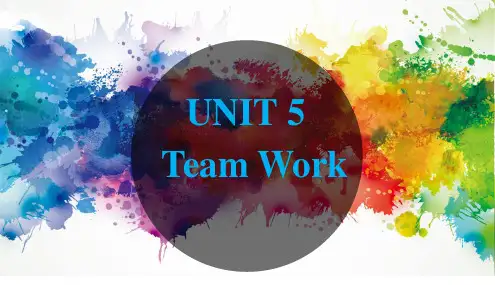
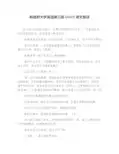
新视野大学英语第三册Unit5课文翻译我从未见过克拉克夫人,但看过她的医疗记录和上一位值班医生交给我的报告后,我知道她今晚会去世。
她屋里的光线来自一台医疗设备,它闪着红光,似乎在发出警告。
我站在那里,一股怪味刺激着我的鼻子,我想起了过去闻到过的腐烂的气味,我闭上了眼睛。
我嘴里有一股从胃里返上来的酸味。
我伸手去开灯。
灯静静地照亮了整个病房,我走回病床边,用无动于衷的、医生的目光观察着病人。
克拉克夫人已奄奄一息了。
她一动不动地躺着:骨瘦如柴的身体使她的头显得特别大;皮肤呈暗黄色,松松地裹在嶙峋的、连毛毯也遮掩不住的骨骼上;她的右臂平伸在床边,被无情地用胶带固定在一块板上,以便能固定针头使液体滴入;左臂横放在深陷的胸部,胸口随着不均匀的呼吸一起一伏。
我伸手去触摸她放在胸口的细长手指。
冰凉冰凉的。
我忙将手移到她的手腕,去感觉那微弱的脉搏。
克拉克夫人将头稍稍转向我,微微地睁开眼。
我俯过身去,勉强听见她微弱的声音:“水。
”我从桌上拿起一杯水,用手指封着吸管的一端,滴了几滴凉凉的水到她的嘴里,以缓解她的干渴。
她没有用力去吞咽,因为力气不够。
“还要,”那干涩的声音说。
于是我们又重复了一次。
这次她终于咽了一些,并轻轻说了声:“谢谢,你。
”她虚弱得没法交谈,所以没等她要求,我就开始做她所需要的。
我像抱孩子似的把她抱起来,给她翻了个身。
除了一件浅色的病号服,她什么也没穿。
她又小又轻,像遭受了严重饥荒一样。
我打开护肤霜的瓶盖,揩了一些在手心。
为了不伤着她,我小心翼翼地把护肤霜擦在她发黄的皮肤上。
她的皮肤松松地在骨头上滑动,背上每块骨头的轮廓都能清楚地摸到。
当我把枕头放在她两腿之间时,发现它们也是冰凉的,直到把手移到她膝盖以上的部位,我才感受到血液供给生命的热度。
而后,我挪了把椅子面朝她坐在床边,握住她那只没被固定的手,此时我又一次注意到她细长的手指。
很优雅。
一时间,我突然想知道她是否有家庭,接着我发现病房里没有花,没有孩子们画的彩虹和蝴蝶,也没有卡片。
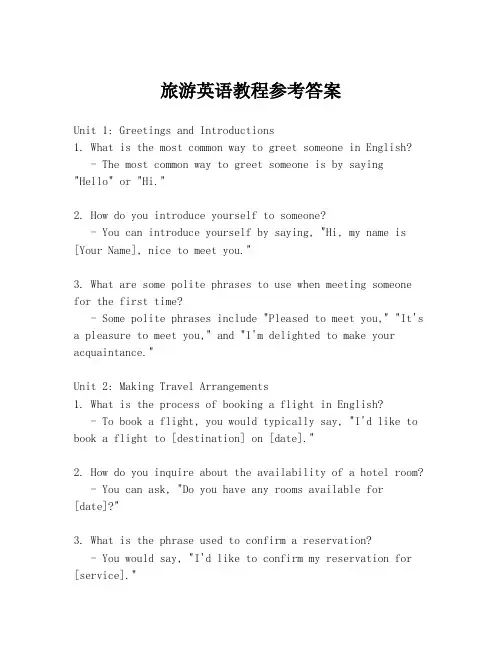
旅游英语教程参考答案Unit 1: Greetings and Introductions1. What is the most common way to greet someone in English? - The most common way to greet someone is by saying "Hello" or "Hi."2. How do you introduce yourself to someone?- You can introduce yourself by saying, "Hi, my name is [Your Name], nice to meet you."3. What are some polite phrases to use when meeting someone for the first time?- Some polite phrases include "Pleased to meet you," "It's a pleasure to meet you," and "I'm delighted to make your acquaintance."Unit 2: Making Travel Arrangements1. What is the process of booking a flight in English?- To book a flight, you would typically say, "I'd like to book a flight to [destination] on [date]."2. How do you inquire about the availability of a hotel room? - You can ask, "Do you have any rooms available for [date]?"3. What is the phrase used to confirm a reservation?- You would say, "I'd like to confirm my reservation for [service]."Unit 3: At the Airport1. What do you say when you need to check in for a flight?- You would say, "I'd like to check in for my flight to [destination]."2. How do you ask for directions to the gate?- You can ask, "Excuse me, could you please direct me to gate [number]?"3. What is the phrase used to request assistance with luggage? - You can say, "Could you help me with my luggage, please?"Unit 4: On the Plane1. How do you ask for a blanket or pillow?- You would ask, "Excuse me, could I get a blanket and a pillow, please?"2. What do you say if you need to use the restroom?- You can say, "Excuse me, where is the restroom, please?"3. How do you request a beverage or snack?- You would say, "Could I have a [beverage or snack], please?"Unit 5: At the Hotel1. What is the phrase used to check into a hotel?- You would say, "I have a reservation for [your name],I'd like to check in."2. How do you ask about the hotel's amenities?- You can ask, "What amenities does the hotel offer?"3. What do you say if you need to request extra towels?- You would say, "Could I get some extra towels, please?"Unit 6: Dining Out1. How do you ask for a table at a restaurant?- You would say, "Do you have a table for [number of people]?"2. What is the phrase used to request the menu?- You can ask, "May I see the menu, please?"3. How do you order a meal in English?- You would say, "I'd like to order [dish name], please."Unit 7: Sightseeing1. How do you ask for directions to a tourist attraction?- You can ask, "Could you tell me how to get to [attraction]?"2. What is the phrase used to buy a ticket for a tour?- You would say, "I'd like to buy a ticket for the [tour name]."3. How do you inquire about the operating hours of a museum? - You can ask, "What are the opening hours of the museum?"Unit 8: Shopping1. How do you ask for the price of an item?- You would ask, "How much does this cost?"2. What is the phrase used to negotiate a price?- You can say, "Could you give me a discount?"3. How do you ask for a receipt?- You would say, "May I have a receipt, please?"Unit 9: Emergency Situations1. How do you ask for help in an emergency?- You would say, "I need help, this is an emergency!"2. What is the phrase used to call for medical assistance? - You can say, "I need a doctor, please!"3. How do you report a lost item?- You would say, "I've lost my [item], can you help me find it?"Unit 10: Cultural Etiquette1. How do you show respect for local customs?- You can say, "I am here to learn about and respect your customs."2. What is the phrase used to apologize for a cultural mistake?- You can say, "I apologize。
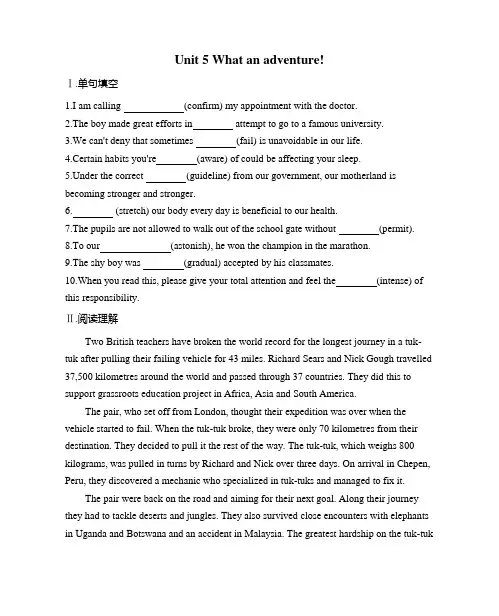
Unit 5 What an adventure!Ⅰ.单句填空1.I am calling (confirm) my appointment with the doctor.2.The boy made great efforts in attempt to go to a famous university.3.We can't deny that sometimes (fail) is unavoidable in our life.4.Certain habits you're(aware) of could be affecting your sleep.5.Under the correct (guideline) from our government, our motherland is becoming stronger and stronger.6. (stretch) our body every day is beneficial to our health.7.The pupils are not allowed to walk out of the school gate without (permit).8.To our(astonish), he won the champion in the marathon.9.The shy boy was (gradual) accepted by his classmates.10.When you read this, please give your total attention and feel the(intense) of this responsibility.Ⅱ.阅读理解Two British teachers have broken the world record for the longest journey in a tuk-tuk after pulling their failing vehicle for 43 miles. Richard Sears and Nick Gough travelled 37,500 kilometres around the world and passed through 37 countries. They did this to support grassroots education project in Africa, Asia and South America.The pair, who set off from London, thought their expedition was over when the vehicle started to fail. When the tuk-tuk broke, they were only 70 kilometres from their destination. They decided to pull it the rest of the way. The tuk-tuk, which weighs 800 kilograms, was pulled in turns by Richard and Nick over three days. On arrival in Chepen, Peru, they discovered a mechanic who specialized in tuk-tuks and managed to fix it.The pair were back on the road and aiming for their next goal. Along their journey they had to tackle deserts and jungles. They also survived close encounters with elephants in Uganda and Botswana and an accident in Malaysia. The greatest hardship on the tuk-tukwas the mountain ranges lying in their path, including the Alps, the Himalayas and the Andes.Nick and Richard uncovered some inspirational projects across Africa, Asia and South America. They witnessed first-hand the educational challenges facing these areas today. They joined street children in the slums of Cairo, Khartoum, Kampala, Mumbai and Phnom Penh. They visited Congolese refugees (难民) in camps in Eastern Burundi. They witnessed how education could free sex-workers in Delhi and victims of human trafficking in Nepal.The pair established The Tuk Tuk Educational Trust, a UK registered charity.Talking about their motivation, Richard said: “The world's leaders have made a commitment to achieving universal primary education but, in spite of this pledge (誓言,承诺), over 57 million primary-aged children worldwide are still out of school; many more are in school, though still cannot access quality learning opportunities.”()1.Why did the two teachers travel the world?A.To support an education project.B.To create a new world record.C.To entertain themselves.D.To challenge themselves.()2.How far did the two teachers pull the tuk-tuk each day on average?A.A little more than 30 kilometres.B.About 14 miles.C.43 miles.D.70 kilometres.()3.What is the third paragraph mainly about?A.How they realized their next goal.B.Their exciting experience on the road.C.The beautiful scenery of famous mountains.D.The difficulties and dangers they faced in the journey.()4.Which of the following best describes the two teachers?A.Curious and brave.B.Humorous and generous.C.Courageous and responsible.D.Efficient and honest.Ⅲ.完形填空I always think how lucky I am that my work as a travel writer introduces me to extraordinary locations, experiences and people. However, my recent hot-air balloon 1 over the breathtaking ancient temples of Bagan has proved the most impressive. Without 2 it will stay with me forever, and years later I can still smile at the fond3 .There are over 2,200 temples and pagodas (宝塔) on the plains of Bagan,4 the 11th and 13th century. For me, Bagan is the place where travel dreams come true.The sunrise hot-air balloon experiences are popular so it's best to book5. My husband Ryan Wright and I were picked up at 5:10 am. After picking up some additional guests, we made our way to the launch field. The pilots introduced themselves and6the basics of ballooning. They were warm,7 and funny and set my nerves at ease.Then,8I even realized what had happened, we were off the ground. The earth just seemed to drop away from the hot-air balloon. 9, I felt nothing when the ropes were released and we started to fly into the sky. Graeme suggested some of the best sights and photo 10, starting with the sunrise.Once the sun was up, the temples and pagodas were even more beautiful. Ranging from 11 groups of buildings to tiny structures, Graeme was keen to point out some of his personal favourites, as well as those buildings experiencing restoration work. Who knew that bamboo scaffolding (脚手架) could be so beautiful 12the sunrise?With the end of our flight approaching, Graeme reminded us of safe landing procedures. I really 13 that he was so clear and focused on 14! We were soon back on solid land. A circle of chairs had been15 for us to enjoy a light breakfast.This hot-air balloon journey was the most wonderful travel experience of my life.()1.A.ride B.driveC.voyageD.transport()mand B.evidenceC.doubtD.basis()3.A.schedule B.memoryC.adventureD.reality()4.A.standing for B.going through C.digging out D.dating from()5.A.at present B.in advance C.as usual D.on purpose()6.A.explored B.judgedC.explainedD.suggested()7.A.grateful rmalC.hopefulD.friendly()8.A.before B.afterC.whenD.since()9.A.Gradually B.Personally C.Strangely D.Regularly()10.A.outlines B.designsC.opportunitiesD.spots()rge B.valuableC.rareD.major()12.A.against B.overC.beyondD.across()13.A.appreciated B.settledC.ignoredD.admitted()14.A.principles petitions C.responsibility D.safety()15.A.came up B.set upC.packed upD.brought upⅣ. 语法填空阅读下面短文,在空白处填入1个适当的单词或括号内单词的正确形式。
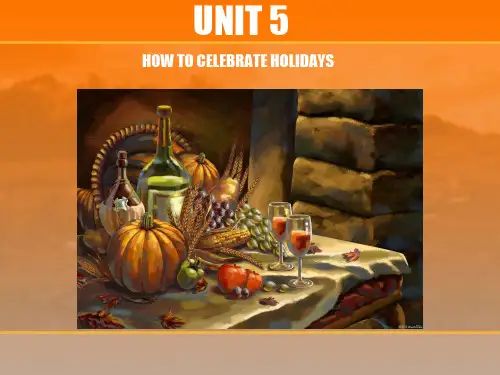

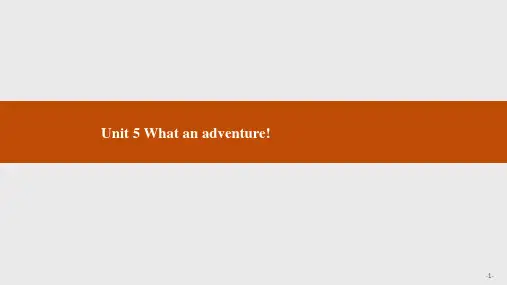
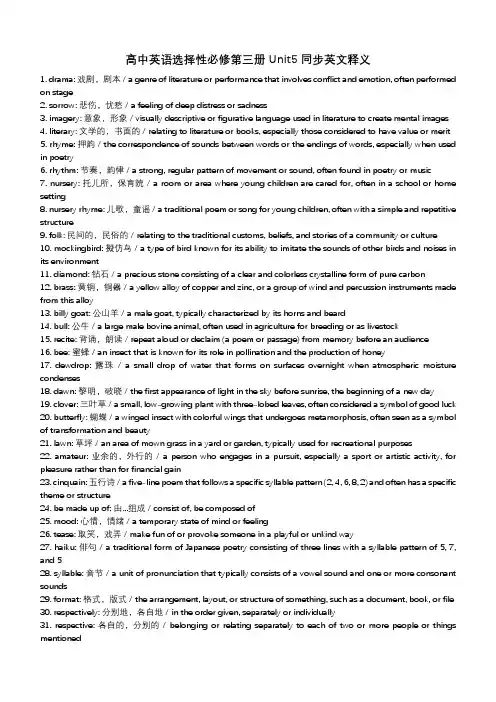
高中英语选择性必修第三册 Unit5 同步英文释义1. drama: 戏剧,剧本 / a genre of literature or performance that involves conflict and emotion, often performed on stage2. sorrow: 悲伤,忧愁 / a feeling of deep distress or sadness3. imagery: 意象,形象 / visually descriptive or figurative language used in literature to create mental images4. literary: 文学的,书面的 / relating to literature or books, especially those considered to have value or merit5. rhyme: 押韵 / the correspondence of sounds between words or the endings of words, especially when used in poetry6. rhythm: 节奏,韵律 / a strong, regular pattern of movement or sound, often found in poetry or music7. nursery: 托儿所,保育院 / a room or area where young children are cared for, often in a school or home setting8. nursery rhyme: 儿歌,童谣 / a traditional poem or song for young children, often with a simple and repetitive structure9. folk: 民间的,民俗的 / relating to the traditional customs, beliefs, and stories of a community or culture10. mockingbird: 擬仿鸟 / a type of bird known for its ability to imitate the sounds of other birds and noises in its environment11. diamond: 钻石 / a precious stone consisting of a clear and colorless crystalline form of pure carbon12. brass: 黄铜,铜器 / a yellow alloy of copper and zinc, or a group of wind and percussion instruments made from this alloy13. billy goat: 公山羊 / a male goat, typically characterized by its horns and beard14. bull: 公牛 / a large male bovine animal, often used in agriculture for breeding or as livestock15. recite: 背诵,朗读 / repeat aloud or declaim (a poem or passage) from memory before an audience16. bee: 蜜蜂 / an insect that is known for its role in pollination and the production of honey17. dewdrop: 露珠/ a small drop of water that forms on surfaces overnight when atmospheric moisture condenses18. dawn: 黎明,破晓 / the first appearance of light in the sky before sunrise, the beginning of a new day19. clover: 三叶草 / a small, low-growing plant with three-lobed leaves, often considered a symbol of good luck20. butterfly: 蝴蝶 / a winged insect with colorful wings that undergoes metamorphosis, often seen as a symbol of transformation and beauty21. lawn: 草坪 / an area of mown grass in a yard or garden, typically used for recreational purposes22. amateur: 业余的,外行的/ a person who engages in a pursuit, especially a sport or artistic activity, for pleasure rather than for financial gain23. cinquain: 五行诗 / a five-line poem that follows a specific syllable pattern (2, 4, 6, 8, 2) and often has a specific theme or structure24. be made up of: 由...组成 / consist of, be composed of25. mood: 心情,情绪 / a temporary state of mind or feeling26. tease: 取笑,戏弄 / make fun of or provoke someone in a playful or unkind way27. haiku: 俳句 / a traditional form of Japanese poetry consisting of three lines with a syllable pattern of 5, 7, and 528. syllable: 音节 / a unit of pronunciation that typically consists of a vowel sound and one or more consonant sounds29. format: 格式,版式 / the arrangement, layout, or structure of something, such as a document, book, or file30. respectively: 分别地,各自地 / in the order given, separately or individually31. respective: 各自的,分别的/ belonging or relating separately to each of two or more people or things mentioned32. blossom: 开花,绽放 / produce flowers, especially in a beautiful or attractive way33. delicate: 精巧的,细致的 / easily broken or damaged, requiring careful handling or sensitive treatment34. await: 等待,期盼 / wait for or expect something to happen35. revolve: 旋转,围绕 / move in a circular orbit around a central point or axis36. utter: 说,发出 / speak or express (a sound or words) audibly37. comprehension: 理解,领悟 / the ability to understand something, grasp the meaning or significance of information38. shelf: 架子,搁板 / a flat, horizontal board attached to a wall, frame, or other structure for the purpose of holding objects39. core: 核心,中心 / the central or most important part of something40. cherry: 樱桃 / a small, round fruit with a bright red or black skin and a hard stone inside41. cherry blossom: 樱花 / the flower of any of several trees of the genus Prunus, especially the Japanese cherry tree42. blank: 空白的,空着的 / empty or not filled in, without any marks or writing43. verse: 诗歌,韵文 / a single line of poetry or a composition in metrical form44. civilian: 平民,民用的 / a person not in the armed services or the police force, relating to non-military or non-official matters45. prose: 散文 / written or spoken language in its ordinary form, without metrical structure46. sympathetic: 同情的,支持的 / showing or feeling understanding or compassion for someone's suffering or difficulties47. sympathy: 同情,同感 / feelings of pity and sorrow for someone else's misfortune48. version: 版本,译本 / a particular form or variant of something, a translation of a work from one language to another49. innocence: 无辜,清白 / the state of being free from sin, guilt, or moral wrongdoing, lack of experience or knowledge50. innocent: 无辜的,天真的 / not guilty of a crime, wrongdoing, or offense, lacking knowledge or awareness51. era: 时代,纪元 / a period of time marked by distinctive character, events, or developments52. correspondence: 通信,信件 / communication by exchanging letters with someone, agreement or similarity between things53. correspond: 符合,一致 / have a close similarity or match, communicate by exchanging letters54. sow: 播种,散布 / plant (seed) by scattering it on or in the earth, cause (a seed or idea) to develop or grow55. seed: 种子 / the unit of reproduction of a flowering plant, capable of developing into another such plant56. dominant: 占优势的,主导的 / exercising control or influence over others, most important or prominent57. sonnet: 十四行诗/ a poem of fourteen lines using formal rhyme schemes, especially one in iambic pentameter58. deadline: 截止日期,最后期限 / the latest time or date by which something should be completed59. contest: 竞赛,比赛 / a competition between individuals or groups, often for a prize or recognition60. polish: 擦亮,抛光 / make smooth and shiny by rubbing, improve or refine in quality or style61. string: 绳,线 / a thin piece of cord or thread, typically used to tie, fasten, or hang things62. wherever: 无论在哪里,无论何处 / in or to whatever place or situation63. barren: 贫瘠的,不毛的 / unable to produce offspring or fruit, unproductive or lacking in qualities that make it desirable or interesting64. grief: 悲伤,悲痛 / deep sorrow, especially that caused by someone's death65. complicated: 复杂的,难懂的 / consisting of many interconnecting parts or elements, intricate or difficult to understand66. variation: 变化,变种 / a change or difference in condition, amount, or level, a different or distinct form ofsomething67. racial: 种族的,人种的 / relating to or associated with a particular race or ethnic group68. prejudice: 偏见,歧视/ preconceived opinion that is not based on reason or actual experience, unfair treatment based on such opinions。
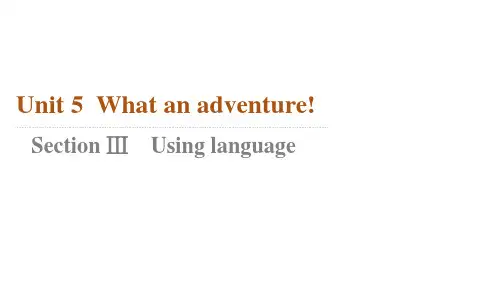
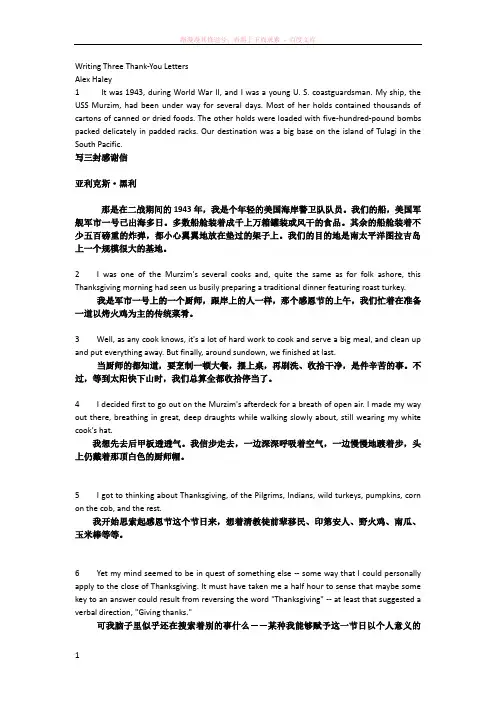
Writing Three Thank-You LettersAlex Haley1 It was 1943, during World War II, and I was a young U. S. coastguardsman. My ship, the USS Murzim, had been under way for several days. Most of her holds contained thousands of cartons of canned or dried foods. The other holds were loaded with five-hundred-pound bombs packed delicately in padded racks. Our destination was a big base on the island of Tulagi in the South Pacific.写三封感谢信亚利克斯·黑利那是在二战期间的1943年,我是个年轻的美国海岸警卫队队员。
我们的船,美国军舰军市一号已出海多日。
多数船舱装着成千上万箱罐装或风干的食品。
其余的船舱装着不少五百磅重的炸弹,都小心翼翼地放在垫过的架子上。
我们的目的地是南太平洋图拉吉岛上一个规模很大的基地。
2 I was one of the Murzim's several cooks and, quite the same as for folk ashore, this Thanksgiving morning had seen us busily preparing a traditional dinner featuring roast turkey.我是军市一号上的一个厨师,跟岸上的人一样,那个感恩节的上午,我们忙着在准备一道以烤火鸡为主的传统菜肴。
3 Well, as any cook knows, it's a lot of hard work to cook and serve a big meal, and clean up and put everything away. But finally, around sundown, we finished at last.当厨师的都知道,要烹制一顿大餐,摆上桌,再刷洗、收拾干净,是件辛苦的事。
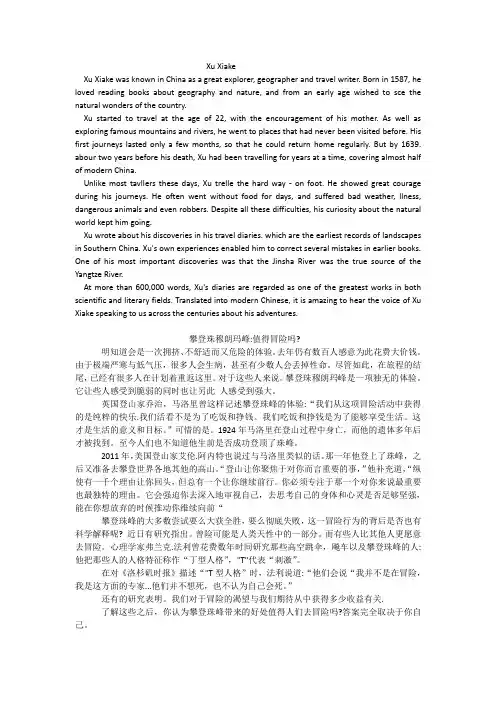
Xu XiakeXu Xiake was known in China as a great explorer, geographer and travel writer. Born in 1587, he loved reading books about geography and nature, and from an early age wished to sce the natural wonders of the country.Xu started to travel at the age of 22, with the encouragement of his mother. As well as exploring famous mountains and rivers, he went to places that had never been visited before. His first journeys lasted only a few months, so that he could return home regularly. But by 1639. abour two years before his death, Xu had been travelling for years at a time, covering almost half of modern China.Unlike most tavllers these days, Xu trelle the hard way - on foot. He showed great courage during his journeys. He often went without food for days, and suffered bad weather, llness, dangerous animals and even robbers. Despite all these difficulties, his curiosity about the natural world kept him going.Xu wrote about his discoveries in his travel diaries. which are the earliest records of landscapes in Southern China. Xu's own experiences enabled him to correct several mistakes in earlier books. One of his most important discoveries was that the Jinsha River was the true source of the Yangtze River.At more than 600,000 words, Xu's diaries are regarded as one of the greatest works in both scientific and literary fields. Translated into modern Chinese, it is amazing to hear the voice of Xu Xiake speaking to us across the centuries about his adventures.攀登珠穆朗玛峰:值得冒险吗?明知道会是一次拥挤、不舒适而又危险的体验。
A mother and her son learn more form a moment of defeat than they ever could from a victory. Her example of never giving up gives him courage for the rest of his life.The Day Mother CriedGerald Moore Coming home from school that dark winter's day so long ago, I was filled with anticipation. I had a new issue of my favorite sports magazine tucked under my arm, and the house to myself. Dad was at work, my sister was away, and Mother wouldn't be home from her new job for an hour. I bounded up the steps, burst into the living room and flipped on a light. I was shocked into stillness by what I saw. Mother, pulled into a tight ball with her face in her hands, sat at the far end of the couch. She was crying. I had never seen her cry. I approached cautiously and touched her shoulder. "Mother?" I said "What's happened?" She took a long breath and managed a weak smile. "It's nothing, really. Nothing important. Just than I'm going to lose this new job. I can't type fast enough." "But you've only been there three days," I said. "You'll catch on." I was repeating a line she had spoken to me a hundred times when I was having trouble learning or doing something important to me. "No." she said sadly. "I always said I could do anything I set my mind to, and I still think I can in most things. But I can't do this." I felt helpless and out of place. At age 16 I still assumed Mother could do anything. Some years before, when we sold our ranch and moved to town, Mother had decided to open a day nursery. She had had no training, but that didn't stand in her way. She sent away for correspondence courses in child care, did the lessons and in six months formally qualified herself for the task. It wasn't long before she had a full enrollment and a waiting list. I accepted all this as a perfectly normal instance of Mother's ability. But neither the nursery nor the motel my parents bought later had provided enough income to send my sister and me to college. In two years I would be ready for college. In three more my sister would want to go. Time was running out, and Mother was frantic for ways to save money. It was clear that Dad could do no more than he was doing already——farming 80 acres in addition to holding a fulltime job. A few months after we'd sold the motel, Mother arrived home with a use typewriter. It skipped between certain letters and the keyboard was soft. At dinner that night I pronounced the machine a "piece of junk." "That's all we can afford," mother said. "It's good enough to learn on." And from that day on, as soon as the table was cleared and the dishes were done, Mother would disappear into her sewing room to practice. The slow tap, tap, tap went on some nights until midnight. It was nearly Christmas when I heard Mother got a job at the radio station. I was not the least bit surprised, or impressed. But she was ecstatic. Monday, after her first day at work, I could see that the excitement was gone. Mother looked tired and drawn. I responded by ignoring her. Tuesday, Dad made dinner and cleaned the kitchen. Mother stayed in her sewing room, practicing. "Is Mother all right?" I asked Dad. "She's having a little trouble with her typing," he said. "She needs to practice. I think she'd appreciate it if we all helped out a bit more." "I already do a lot," I said, immediately on guard. "I know you do," Dad said evenly. "And you may have to do more. You might just remember that she is working primarily so you can go to college." I honestly didn't care. I wished she would just forget the whole thing. My shock and embarrassment at finding Mother in tears on Wednesday was a perfect index of how little I understood the pressures on her. Sitting beside her on the couch, I began very slowly to understand. "I guess we al have to fail sometime," Mother said quietly. I could sense her pain and the tension of holding back thestrong emotions that were interrupted by my arrival. Suddenly, something inside me turned. I reached out and put my arms around her. She broke then. She put her face against my shoulder and sobbed. I help her close and didn't try to talk. I knew I was doing what I should, what I could, and that it was enough. In that moment, feeling Mother's back racked with emotion, I understood for the first time her vulnerability. She was still my mother, but she was something more: a person like me, capable of fear and hurt and failure. I could feel her pain as she must have felt mine on a thousand occasions when I had sought comfort in her arms. A week later Mother took a job selling dry goods at half the salary the radio station had offered. "It's a job I can do," she said simply. But the evening practice sessions on the old green typewriter continued. I had a very different feeling now when I passed her door at night and heard her tapping away. I knew there was something more going on in there than a woman learning to type. When I left for college two years later, Mother had an office job with better pay and more responsibility. I have to believe that in some strange way she learned as much from her moment of defeat as I did, because several years later, when I had finished school and proudly accepted a job as a newspaper reporter, she had already been a journalist with our hometown paper for six months. The old green typewriter sits in my office now, unrepaired. It is a memento, but what it recalls for me is not quite what if recalled for Mother. When I'm having trouble with a story and think about giving up or when I start to feel sorry for myself and think things should be easier for me, I roll a piece of paper into that cranky old machine and type, word by painful word, just the way mother did. What I remember then is not her failure, but her courage, the courage to go ahead. It's the best memento anyone ever gave me. NEW WORDS anticipation n. expectation anticipate vt. issue n. 发⾏物(刊物的)⼀期 tuck vt. put or push into a desired convenient position so as to hold tightly; draw together into a small space 塞(进);卷(起) bound vi. move along quickly by jumping or leaping movements 跳跃 flip v. turn or move quickly or with a jerk tight a. drawn, fixed or fastened together firmly 紧的,牢的 ad. firmly, closely couch n. a long comfortable seat with a back and arms on which more than one person may sit; sofa 长沙发椅 approach v. come near or nearer(to) cautiously ad. very carefully 细⼼地,谨慎地 cautious a. type vt. write (sth.) with a typewriter line n. a row of words in a poem; a row of words on a page of writing or in print (诗、⽂的)⼀⾏ helpless a. unable to look after oneself or take action to help others, powerless assume vt. take as true without actual proof; suppose 假设,主观认为 ranch。
Unit 5TEXT IThe Light at the End of the ChunnelTextIn a hotel lobby in Sandgate, England, not two miles from the soon-to-be-opened English Channel Tunnel, stiff upper lips trembled. For the first time since the last ice age, England was about to be linked to France."I'd rather England become the 51st state of the U. S. A. than get tied up to there," said a retired civil servant with a complexion the color of ruby port. He nodded toward the steel gray Channel out the window, his pale blue eyes filled with foreboding."A wful place," added his wife, lifting a teacup to her lips. "They drink all the time, and the food is terrible. When I go to the Continent, I take my own bottle of English sauce.""We don't care much for the French," her husband concluded. "But the French. ..." Here a pause, a shudder, as the gull-wing eyebrows shot upward. "The French don't care for anybody."On the other side of the Channel, the entente was scarcely more cordiale. In Vieux Coquelles, a village a beet field away from the French terminal near Calais, Clotaire Fournier walked into his farmhouse."I went to England once," he said, sinking into a chair in the dining room. "Never again! All they eat is ketchup. " A tiny explosion of air from pursed lips, then the coup de grac e. "Y ou can't even get a decent glass of red wine!"Well, by grace of one of the engineering feats of the century, for richer or poorer, better or worse, England and France are getting hitched. On May 6, 1994, Queen Elizabeth of Britain and President Francois Mitterrand of France are scheduled to inaugurate the English Channel Tunnel ("Chunnel" for short), sweeping aside 200 years of failed cross-Channel-link schemes, 1,000 years of historical rift, and 8,000 years of geographic divide.The 31-mile-long Chunnel is really three parallel tunnels: two for trains and a service tunnel. It snakes from Folkestone, England, to Coquelles, France, an average of 150 feet below the seabed. Drive onto a train at one end; stay in your car and drive off Le Shuttle at the other 35 minutes later. Later this year [i. e. , 1994] Eurostar passenger trains will provide through service: London to Paris in three hours; London to Brussels in three hours, ten minutes.The Chunnel rewrites geography, at least in the English psyche. The moat has been breached. Britain no longer is an island.It's June 28, 1991, and I'm packed into a construction workers' train along with several dozen other journalists. We're headed out from the English side to the breakthrough ceremony for the south running tunnel — the last to be completed.The Chunnel is a work in progress. The concrete walls await final installation of the power, water, and communication lines that will turn it into a transport system. White dust fills the air. The train screeches painfully. "Makes you appreciate British Rail," someone jokes.Finally we reach the breakthrough site. The two machines that dug this tunnel started from opposite sides of the Channel and worked toward the middle. Now we're staring at the30-foot-diameter face of the French tunnel boring machine (TBM), "Catherine."In one of those vive la difference quirks that color the project, the French gave women's names to their machines. On the British side, it's by the numbers — like TBM No. 6. Another difference: French workers wear chic, well-cut, taupe jumpsuits with red and blue racing stripes down the sleeves. The British uniform is pure grunge: baggy, bright orange.Looking up, I imagine 180 feet of Channel above my head —ferries, tankers, a Dover sole or two. ...The grating of the TBM interrupts my reverie. Its cutterhead — a huge wheel with tungsten-tipped teeth — chews into the last trace of rock separating England from France.Music blares, and lights glare. Several Frenchmen scramble through. Thunderous applause erupts as dozens more follow. Strangely moving, this connecting of countries. Champagne corks pop, and French workers hug British counterparts."I might have opposed it 30 years ago, but now it's my tunnel," an Englishman says.French tunnelers are still climbing through. "So many," I say, turning to a French official."And there are 56 million more behind them," he replies.Apres le tunnel, le deluge? Eurotunnel hopes so. It predicts eight million passengers a year by 1996. The flow will be lopsided. Only 30 percent of the traffic will be headed to Britain. "The French don't take holidays in England," explains Jeanne Labrousse, a Eurotunnel executive. Hmmmm. Why do the French visit Britain? For the food? The weather? Fashion?Mme. Labrousse seemed thoughtful."Of course," she brightened, "we will work on selling the idea."From National Geographic, May 1994, by Cathy Newman.。